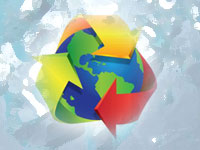Good Conduct Code for Recyclers
 GLOBE-Net - Electronics recyclers have a new guide on how to run safe and environmentally sound recycling operations. Released by the U.S. Environmental Protection Agency (EPA), it is meant to help recyclers protect the environment, care for workers’ safety and promote public health.
GLOBE-Net - Electronics recyclers have a new guide on how to run safe and environmentally sound recycling operations. Released by the U.S. Environmental Protection Agency (EPA), it is meant to help recyclers protect the environment, care for workers’ safety and promote public health. It also will help customers verify that electronics recycling companies are truthful about how they manage end-of-life electronic equipment. An accreditation program will be established to distinguish firms that follow these new guidelines from those whose claims are dubious at best.
The Responsible Recycling (R2) Practices for Use in Accredited Certification Programs for Electronics Recyclers provides 13 principles that are to be adhered to on a voluntary basis. For instance, companies agree to separate, by hand or by machine, materials that cannot be recycled. These are to be sent to an appropriate recovery facility.
Recyclers also agree to name the countries that receive their shipments and to provide paperwork that proves these countries are willing to be on the receiving end. Proof includes documents from the country’s competent authorities or copies of a court ruling that explains why the materials have the right to be shipped. These measures are meant to stop companies from illegally exporting electronic waste to poor countries after having promised to recycle it.
Recyclers must also destroy all data left on hard drives. They cannot resell equipment without prior consent. They must make sure that the materials they transport are packaged correctly since accidents can threaten people’s lives and damage the environment. As for employees, they need access to respirators, eyewear and cut-resistant gloves to protect them from injury.
“There should be no doubt that choosing to reuse or recycle used electronics is the right choice for our environment,” said Susan Parker Bodine, assistant administrator for EPA’s Office of Solid Waste and Emergency Response. “These voluntary guidelines will help assure Americans that their used electronics will be recycled safely and responsibly.”
The workgroup that developed the guidelines represent federal and state governments, electronics manufacturers and recyclers, and trade associations. It will now focus on establishing the certification process, which will allow consumers to recognize responsible recyclers in the marketplace.
Reusing and recycling used electronics helps the environment. It saves energy, reduces air pollution, preserves water resources and reduces the consumption of fresh raw materials.
Yet a great deal of electronic waste still ends up in landfills. American consumers, for instance, throw out 130,000 computers every day and 100 million cell phones every year. And this e-waste is filled with toxic substances.
“Lead, cadmium, mercury, chromium, and polyvinyl chloride, all of these materials have known toxicological effects that range from brain damage, kidney disease, to mutations, cancers,” says Allen Hershkowitz, a senior scientist with the Natural Resources Defense Council during an interview with 60 Minutes.
Some television monitors, for instance, contain up to four pounds of lead, a toxin that can cause brain damage in children. Other toxic metals found in computer processing units, such as lithium, cause health defects as well. Globe-Net provides a more detailed account on this topic in the article Wrestling with E-waste.
You can return to the main Market News page, or press the Back button on your browser.

